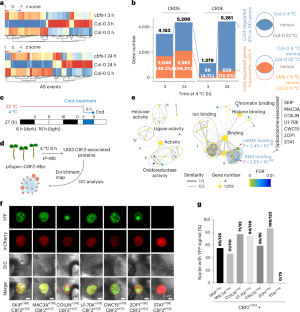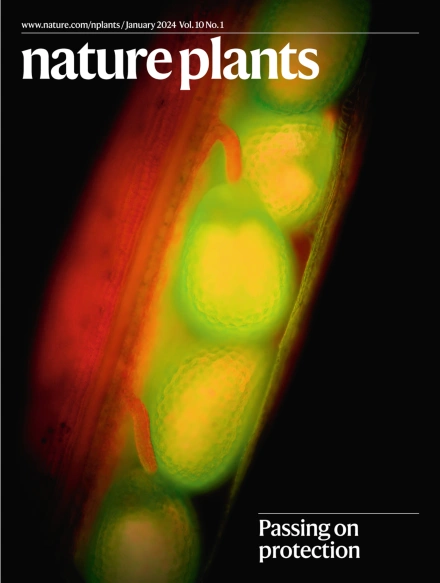Regulation of alternative splicing by CBF-mediated protein condensation in plant response to cold stress
IF 15.8
1区 生物学
Q1 PLANT SCIENCES
引用次数: 0
Abstract
Cold acclimation is critical for the survival of plants in temperate regions under low temperatures, and C-REPEAT BINDING FACTORs (CBFs) are well established as key transcriptional factors that regulate this adaptive process by controlling the expression of cold-responsive genes. Here we demonstrate that CBFs are involved in modulating alternative splicing during cold acclimation through their interaction with subunits of the spliceosome complex. Under cold stress, CBF proteins accumulate and directly interact with SKI-INTERACTING PROTEIN (SKIP), a key component of the spliceosome, which positively regulates acquired freezing tolerance. This interaction facilitates the formation of SKIP nuclear condensates, which enhances the association between SKIP and specific cold-responsive transcripts, thereby increasing their splicing efficiency. Our findings uncover a regulatory role of CBFs in alternative splicing and highlight their pivotal involvement in the full development of cold acclimation, bridging transcriptional and post-transcriptional regulatory mechanisms. CBF transcription factors facilitate the formation of SKIP nuclear condensates to increase the splicing efficiency of cold-responsive transcripts, bridging transcriptional and post-transcriptional regulation during cold acclimation.


cbf介导的蛋白缩合在植物冷胁迫响应中的选择性剪接调控
低温适应对植物在温带低温环境下的生存至关重要,而C-REPEAT结合因子(CBFs)是通过控制冷响应基因的表达来调节这一适应过程的关键转录因子。在这里,我们证明了cbf通过与剪接体复合物亚基的相互作用参与调节冷驯化过程中的选择性剪接。在低温胁迫下,CBF蛋白积累并直接与剪接体的关键组分SKI-INTERACTING PROTEIN (SKIP)相互作用,正向调节获得性抗冻性。这种相互作用促进了SKIP核凝聚物的形成,从而增强了SKIP与特异性冷响应转录本之间的关联,从而提高了它们的剪接效率。我们的研究结果揭示了CBFs在选择性剪接中的调节作用,并强调了它们在冷驯化的全面发展、转录和转录后调节机制中的关键作用。
本文章由计算机程序翻译,如有差异,请以英文原文为准。
求助全文
约1分钟内获得全文
求助全文
来源期刊

Nature Plants
PLANT SCIENCES-
CiteScore
25.30
自引率
2.20%
发文量
196
期刊介绍:
Nature Plants is an online-only, monthly journal publishing the best research on plants — from their evolution, development, metabolism and environmental interactions to their societal significance.
 求助内容:
求助内容: 应助结果提醒方式:
应助结果提醒方式:


